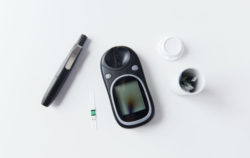 Necrotizing fasciitis causes may include the use of sodium glucose co-transporter 2 inhibitor (SGLT2) type-2 diabetes drugs such as Steglujan.
Necrotizing fasciitis causes may include the use of sodium glucose co-transporter 2 inhibitor (SGLT2) type-2 diabetes drugs such as Steglujan.
According to Diabetes in Control, the U.S. Food and Drug Administration (FDA) issued a formal warning to the public concerning the role Steglujan and other SGLT2 inhibitors might play in contracting this otherwise extremely rare flesh-eating bacterial infection.
The safety announcement referred to 12 cases of Fournier’s gangrene that had shown up in patients who used SGLT2 inhibitors. After investigation was completed, the FDA reportedly made the decision to require a warning to be placed in the medication guide of Steglujan and other drugs of this class.
Diabetes in Control says that Fournier’s gangrene is a life-threatening infection that attacks the subcutaneous tissue in the perineum or area between the rectum and testes in males and vulva in females.
The warning says that use of these drugs may be among necrotizing fasciitis causes in diabetics. While this may be true to a degree, the National Organization for Rare Disorders says that one of the key factors involved in its contraction is a compromised immune system. This can be part and parcel of the disease of diabetes itself as well as comorbid factors such as obesity, pelvic vascular dysfunction, and various cancers.
Necrotizing fasciitis causes also might be found among pre-existing conditions such as a cut or urinary tract infection or fungal infection. WebMD lists urinary tract infections and yeast or fungal infections among possible side effects of SGLT2 inhibitor use.
What are the Symptoms of Fournier’s Gangrene and How is It Treated?
The symptoms of Fournier’s gangrene can be as varied as the individual, but acute pain and inflammation coupled with an unusual fetid smell of the genital region are at the top of the list. It is very likely that, if these symptoms are present, the patient is also sporting an elevated fever.
If allowed to progress, the invading bacteria can become systemic and threaten the life of the individual. Quick intervention seems to be the key in addressing this flesh-eating bacteria. Treatment includes the use of heavy antibiotic therapy and surgical removal of dead tissue.
If required, plastic surgery may be utilized to restore the area to an appearance of normalcy and may even be needed to assist with function.
Why are SGLT2 Inhibitors Among Necrotizing Fasciitis Causes?
Another theory about this class of drugs is that the way they function predisposes the body to invading bacteria. Bacteria thrive on sugars. SGLT2 inhibitors encourage the kidneys to release excess glucose from the body rather than send it back into the bloodstream for re-absorption.
This means that the urine output has higher sugar content than normal and provides an attraction to opportunistic bacteria, encouraging them to take hold.
Join a Free Diabetes Medications & Flesh-Eating Infection Lawsuit Investigation
The type-2 diabetes medications linked to the flesh-eating infection include:
- Invokana
- Invokamet/Invokamet XR
- Farxiga
- Xigduo XR
- Qtern
- Jardiance
- Glyxambi
- Synjardy/Synjardy XR
- Steglato
- Segluromet
- Steglujan
If you or a loved one took one of the type-2 diabetes medications listed above and suffered from a flesh-eating genital infection, you may qualify to join this diabetes medication lawsuit investigation. Fill out the FREE form on this page for more information.
ATTORNEY ADVERTISING
Top Class Actions is a Proud Member of the American Bar Association
LEGAL INFORMATION IS NOT LEGAL ADVICE
Top Class Actions Legal Statement
©2008 – 2026 Top Class Actions® LLC
Various Trademarks held by their respective owners
This website is not intended for viewing or usage by European Union citizens.
Get Help – It’s Free
Join a Free Diabetes Medications & Flesh-Eating Infection Lawsuit Investigation
If you qualify, an attorney will contact you to discuss the details of your potential case at no charge to you.
PLEASE NOTE: If you want to participate in this investigation, it is imperative that you reply to the law firm if they call or email you. Failing to do so may result in you not getting signed up as a client or getting you dropped as a client.
E-mail any problems with this form to:
[email protected].
Oops! We could not locate your form.












